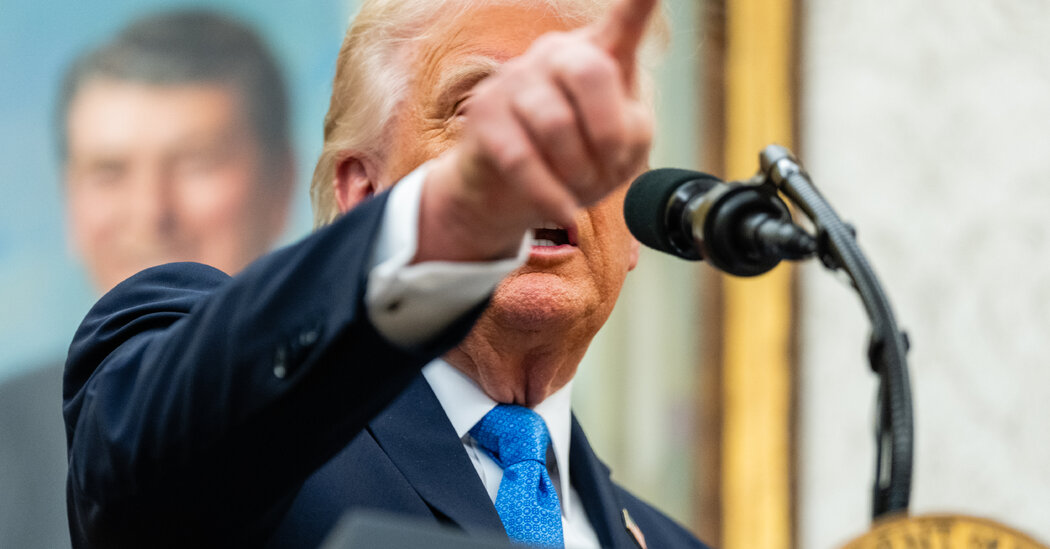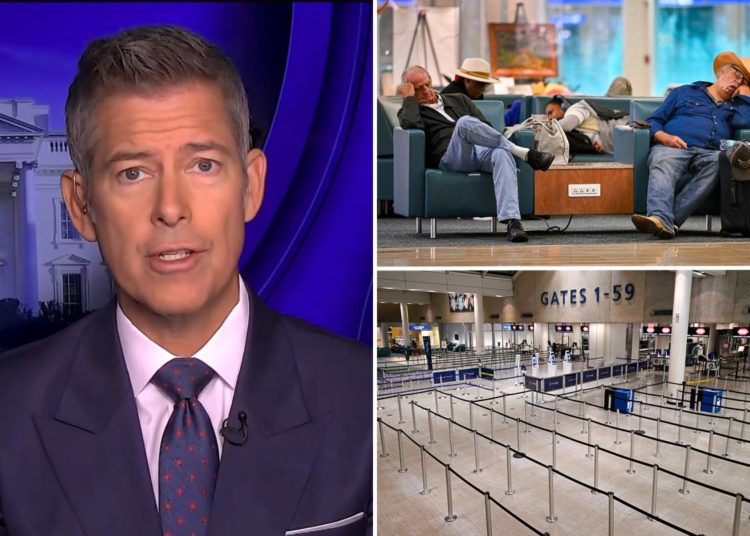Hedge your language. Don’t be too specific. Don’t say “Trump.”
For chief executives, speaking in public has become a tightrope walk. Say the wrong word and it might tick off the White House.
As companies start to feel the impact of President Trump’s tariffs, especially the 30 percent tax on Chinese goods, they have a responsibility to tell their investors how they will deal with the higher costs. For many companies, that means raising prices.
But Mr. Trump, who insists that other countries are paying the tariffs, doesn’t want to hear that. So executives are speaking even more delicately than usual, including on the perfunctory quarterly earnings calls that are normally only of interest to Wall Street.
Since Mr. Trump’s first term, corporate leaders have been wary of the president’s habit of taking to social media and singling out companies and executives that he feels are working against his economic or political agenda.
Mr. Trump’s second term has brought a new intensity to the situation, according to crisis communication experts and consultants who work closely with chief executives. Mattel, Ford, Amazon and Apple’s chief executive Tim Cook have faced his ire in recent weeks.
“Companies have got to reconcile with the fact that politics has penetrated nearly every element of their business and to bake those considerations in to prepare your C.E.O.s,” said Brett Bruen, president of the consulting firm Global Situation Room, which is based in Washington.
And tariffs, a central pillar of Mr. Trump’s economic policy, potentially hit squarely where it hurts companies the most: profits.
Last week, on an earnings call with Wall Street analysts, Doug McMillon, Walmart’s chief executive, thanked Mr. Trump for reducing tariffs on China to 30 percent from 145 percent, but added that the retailer probably would not be able to “absorb all the pressure.” The company’s chief financial officer said in an interview on CNBC that Walmart planned to raise some prices starting this month.
Days later, Mr. Trump wrote on Truth Social that “Walmart should STOP trying to blame Tariffs as the reason for raising prices.” He then went on to demand that China and Walmart, which is the largest retailer in the United States, “EAT THE TARIFFS.” He ended with the warning: “I’ll be watching, and so will your customers!”
Executives across corporate America are heeding that warning.
During quarterly earnings calls, on TV interviews and in meetings with investors, executives share details about their recent businesses performance and what obstacles they may face ahead. Analysts take in this information to build financial models, which help them gauge whether to buy or sell a company’s shares. Right now, tariffs are the topic du jour.
Chief executives have a responsibility to investors to speak directly about the impact that tariffs are having on their business, said Stephan Meier, the chair of the management division at Columbia Business School. Retailers are especially vulnerable to tariffs because they import a significant amount of goods from China.
“This is on everybody’s mind, this affects the business as very few things have in the past,” Mr. Meier said. “You can’t dance around it. You have to call it what it is.”
He said that tailoring talk of tariffs in a way that avoids upsetting the Trump administration would not be “honest, authentic and transparent.”
But executives are finding that speaking too plainly has consequences. When Mattel released its earnings in early May, the maker of Barbie said it would raise prices on U.S. toys because of tariffs on imports from China, then totaling 145 percent. It also scrapped its financial forecast for the year, citing uncertainty over trade and tariff policies.
Mattel’s chief executive, Ynon Kreiz, went on CNBC and was asked whether it would be cheaper for the company to manufacture toys in the United States. “We don’t see that happening,” he said.
A few days later, in the Oval Office, Mr. Trump didn’t hide his disdain for the Mattel boss. He threatened to impose a 100 percent tariff on Mattel’s products, saying the company “won’t sell one toy in the United States.” He also said, “I wouldn’t want to have him as an executive too long.”
Those advising chief executives in this fraught moment say they are telling leaders to describe the financial impacts of tariffs in the gentlest way possible. Talk about the “fluid” or “uncertain economic environment” without naming the White House policy that created those conditions, advisers suggest. Consult your government affairs person. Play up the opportunity to increase “productivity” rather than discussing the time and money spent figuring how to rejigger a company’s global supply chain. And if something has to be said about tariffs, let the chief financial officer address it, not the chief executive.
Even the word tariff itself is to be avoided, said Denise Dahlhoff, director of marketing and communications research at the Conference Board, a business group. “More neutral terms to use are ‘sourcing cost’ or ‘input cost’ or ‘supply chain cost’ — they are not as incendiary as ‘tariff,’” she said.
Consultants said to expect to continue hearing a variety of euphemisms about tariffs and their impact on prices. On Tuesday, Home Depot’s chief financial officer, Richard McPhail, said the home-improvement retailer intended to “generally maintain our current pricing levels.” Translation: The prices won’t rise. Unless they have to.
Target executives received a chorus of questions from analysts on their earnings call on Wednesday about just how much tariffs would influence their business performance and prices. When listing possible strategies, executives put pricing changes at the end of their list. Brian Cornell, the retailer’s chief executive, said “price is the very last resort.”
That’s a departure from how Mr. Cornell talked about tariffs in March when he clearly stated that fruit and vegetable prices would rise because of the tariffs then levied on Mexico.
Analysts and consultants expect that retail executives in the coming weeks will try to avoid passing judgment on the tariffs during the calls they hold with investors and analysts.
“Are they afraid of Trump? The answer is yes,” David Swartz, senior equity analyst at Morningstar, said. “Nobody wants to be on his radar, and the relatively minor things that Walmart and Mattel said — which are obvious — he gets mad at them essentially for saying the truth about something that he caused.”
Fear, he said, has made companies take the line “that tariffs are just a fact and this is what we’re dealing with, rather than taking a side on whether they are good or bad.”
It’s a prudent strategy for individual chief executives to not be confrontational, said Jeffrey Sonnenfeld, a Yale School of Management professor who is in frequent contact with corporate leaders. But if they wanted to influence political leaders, “they need collective action,” he said.
“Trade groups need to be confrontational with the facts,” Mr. Sonnenfeld said, “or else the American public and legislators can’t help them because they don’t understand what’s going on.”
Danielle Kaye contributed reporting.
Jordyn Holman is a business reporter for The Times, covering the retail industry and consumer behavior.
The post C.E.O.s Mind Their Language to Avoid Landing on Trump’s Radar appeared first on New York Times.




